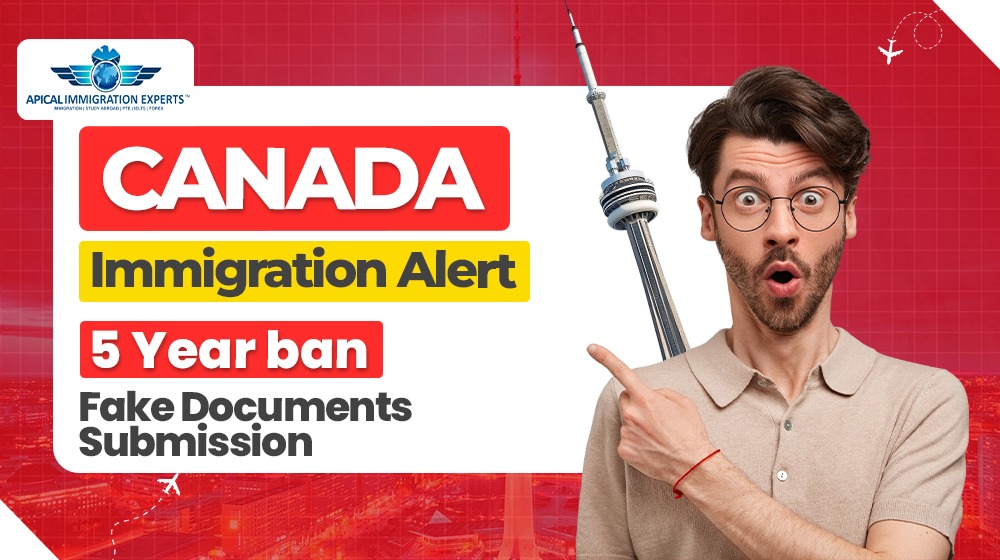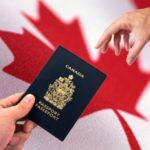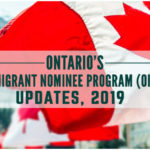
Canada Immigration Alert: 5-Year Ban for Fake Documents Submission
Canada has issued a strong warning to anyone trying to submit fake or altered documents in immigration applications. Immigration, Refugees and Citizenship Canada (IRCC) says that providing fraudulent information can lead to serious consequences, including a ban of at least five years from entering Canada.
Immigration fraud remains a major concern for both applicants and Canada’s immigration system. Every year, thousands fall prey to scams that promise fast approvals, guaranteed visas, or fake job offers. IRCC recently reported that thousands of applications are rejected each month because of fraudulent documents. In 2024 alone, the department conducted over 9,000 monthly investigations into suspected visa fraud.
“Misrepresentation is not just risky; it can result in a ban of five years or more. Many applicants underestimate how strict IRCC is with fraud checks. It is always safer to be honest and work with a licensed professional than to take shortcuts,” said Egidija Benotiene, founder of Benotas Immigration and a licensed Regulated Canadian Immigration Consultant (RCIC).
Recent Fraud Case in India
In a recent case, Bengaluru police started investigating Owlspriority India Pvt Ltd after several job seekers reported being cheated. The first FIR was filed on September 22 at Puttenahalli Police Station by 25-year-old Chandan.
The company claimed to be a legitimate Canadian immigration consultancy with offices in Vancouver and Bengaluru. It even ran a professional-looking website. Chandan found the company through a social media advertisement in January 2023, which promised help with Canadian jobs and visa applications.
Chandan registered online and was contacted by a company representative, who requested ₹1,500 for an eligibility test. Later, he visited their JP Nagar office, where he was assured a permanent visa and job in Canada for a total fee of ₹1 lakh. Chandan paid half upfront and the remainder a month later. He also submitted his WES and IELTS certificates and signed a Client Retainer Agreement, receiving a copy via email.
After a few months, the company stopped communicating. Office visits went unanswered, and Chandan never received a refund. He also alleged that the firm created fake profiles in his name for Canada’s Express Entry program. Police confirmed that other complaints and online reviews reported similar fraudulent activities.
What IRCC Considers Immigration Fraud
IRCC considers it fraud to submit false or altered documents during the immigration process. These include:
-
Passports and travel documents
-
Visas, entry, or exit stamps
-
Language test results (e.g., IELTS)
-
Job offers, employment verification, or contracts
-
Acceptance letters, transcripts, or tuition receipts from institutions
-
Diplomas, degrees, or trade certificates
-
Relationship documents (birth, marriage, adoption, or divorce)
-
Police certificates or court documents
-
DNA test results
Even lying about physical presence in Canada while renewing a permanent residency card or applying for citizenship counts as fraud.
Penalties for Submitting Fake Documents
Submitting fake documents or misrepresenting facts can have serious consequences:
-
Refusal of application: Your application can be denied.
-
Five-year ban: You may be barred from entering Canada for at least five years.
-
Permanent fraud record: IRCC may attach a fraud record to your profile permanently.
-
Revocation of status: Temporary or permanent immigration status may be revoked.
-
Loss of citizenship or reapplication ban: Existing citizenship may be stripped, or reapplication may be prohibited for five years.
-
Removal from Canada: In extreme cases, deportation is possible.
IRCC also investigates relationship-of-convenience fraud, where applicants enter fake marriages or partnerships to gain immigration benefits. Officers detect such cases through document checks, home visits, and interviews.
Chargeback Fraud
Chargeback fraud occurs when applicants reverse credit card payments made during the visa process. This can result in:
-
Visa application cancellation or delays
-
A travel ban of up to 10 years
-
Negative effects on future applications
IRCC warns that attempting shortcuts, submitting fake documents, or using fraudulent consultancies can jeopardize your immigration journey for years.
How to Stay Safe
To protect your application and avoid penalties:
-
Verify consultancy credentials: Work only with licensed Regulated Canadian Immigration Consultants (RCICs).
-
Avoid shortcuts: Do not trust firms promising guaranteed visas or jobs.
-
Submit genuine documents: Always provide authentic and verifiable documents.
-
Report fraud: Notify authorities and IRCC immediately if you suspect a scam.
Canada remains a top destination for skilled workers, students, and families. However, IRCC’s strict fraud checks ensure that only genuine applicants benefit from its immigration programs. Following the rules and working with licensed professionals is essential for a smooth and successful immigration process.
Stay Alert on Immigration Rules
Canada has strict measures against fraudulent visa applications. Applicants should ensure all documents are genuine and avoid shortcuts that could lead to a five-year ban.
Protect Your Application
Work with licensed immigration consultants and submit only authentic documents to prevent penalties or application refusal.
Get Expert Guidance
Reach out for a FREE consultation to review your documents and ensure compliance with IRCC rules.Contact Us:
- Email: info@immigrationxperts.com
- Call us: +91-9999467686, +91-8447-696555





